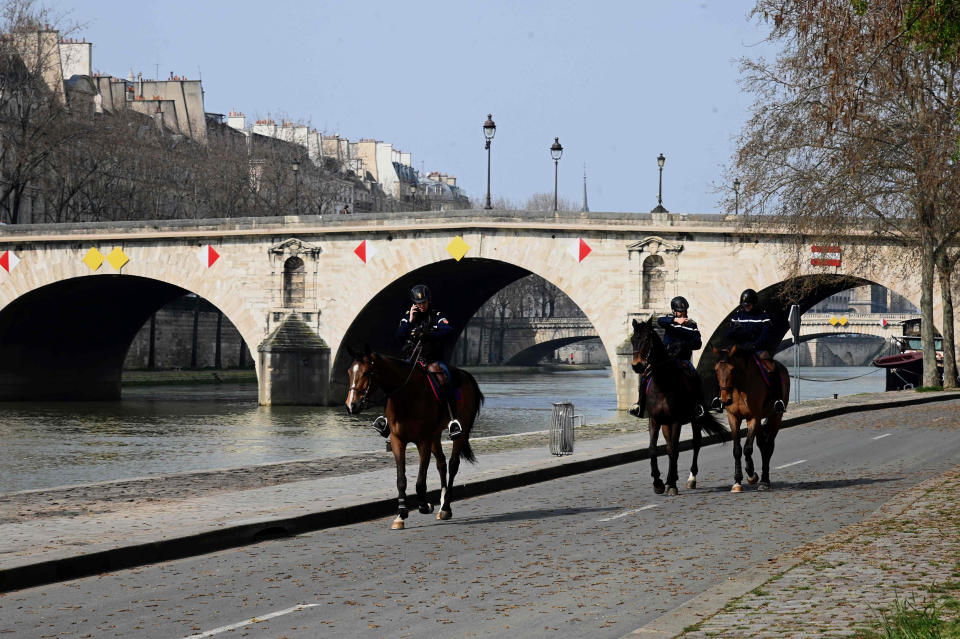Boris Johnson's libertarian views behind apparent hesitancy to lock down Britain
LONDON — Coronavirus deaths are beginning to spiral in the United Kingdom. The government's expert advisers warn that the only way to contain the disease is to impose draconian controls on people's social lives for 18 months until a vaccine is found.
But — despite dire warnings that his health service may be overwhelmed — Prime Minister Boris Johnson resisted forcing his population to adopt the types of lockdown measures seen in the United States and across Europe until Friday, when he announced that all pubs, cafes, restaurants, nightclubs and gyms were to close down for the forseeable future.
"The speed of our eventual recovery depends entirely on our collective ability to get on top of the virus now and that means we have to take the next steps on scientific advice," Johnson told his daily COVID-19 news conference.
He added: "We need now to push down further on that curve of transmission between us."
The move came after California issued a stay-at-home order for its 40 million residents, and France and Italy began fining anyone venturing outside without good reason. Border controls on land and air are in force across Europe and beyond.
Until Friday, Johnson had asked — not told — people to stop nonessential contact, to avoid bars, restaurants and theaters, and to self-isolate if they or one of their family members has symptoms. Only this week did he close schools for all but the children of essential workers.
This policy can partly be explained by the prime minister's own strong sense that the government should not tell people what to do unless absolutely necessary, according to Guto Harri, who was a spokesman for Johnson when he was mayor of London.
"He's not some anarchist libertarian, but he does approach things on the basis that you really have to set the bar quite high to justify the state getting involved in people's everyday lives," Harri told NBC News by telephone Friday.
"It's not an absolute, but he does have to be persuaded that drastic measures are justified," he added. "He also has a more benign view of human nature than the assumption that everyone needs to be treated like a child and be told by daddy what to do."
Johnson's government had already had to drastically alter course after its team of expert forecasters found that the initial plan to "mitigate" the outbreak — not preventing the spread but merely trying to slow it down — could result in the deaths of 250,000 people.
It has now pivoted to trying to "suppress" the virus through advising people to adopt a more hard-line regime of social distancing. On Thursday, Johnson said adoption of this policy was "very patchy," particularly in London, which has emerged as a hot spot in recent days.

Johnson's own liberal philosophy will only be one factor in the government's decision-making process.
During his daily briefings he has been flanked by professor Chris Whitty, who is England's chief medical officer, and Sir Patrick Vallance, the government's chief scientific adviser. Both are highly respected experts who have remained in lockstep with Johnson's guidance.
So it is clear the U.K. is basing its decisions on the advice of teams of experts. But so are other countries, most of which have acted far quicker in imposing the types of policies that would seem borderline authoritarian in normal times, but are increasingly commonplace now.
That's led to criticism of Johnson's government, plenty of it from leading experts, who for weeks have shouted from the rooftops that, given the exponential nature of this outbreak, waiting to act will cost lives.
This morning on the London Underground (left) and the Toronto subway (right).
One of these cities is getting its act together. One is hurtling towards catastrophe. pic.twitter.com/l3Fhrm5S8T— Scott Gilmore (@Scott_Gilmore) March 20, 2020
Harsher controls may be imminent in the U.K. — but Johnson will not have arrived there lightly, Harri said. "He's progressing with a hesitation and a reluctance which I think is healthy."
Having worked with Johnson for years, Harri believes that looking at three of the prime minister's heroes are key when interpreting his general worldview.
One of these role models is the mayor in the 1975 movie "Jaws," who kept the beaches open and refused to disrupt daily life — despite there being an aggressive great white shark roaming the waters.
"A gigantic fish is eating all your constituents and he decides to keep the beach open," Johnson said in a speech in 2007. "It turned out he was wrong. But it remains that he was heroically right in principle."

For Harri, the moral of that story in "Jaws" is that every decision has a downside; closing the beaches might have saved a few lives but it also would ruin the local economy, possibly harming more people in the long run.
Another of Johnson's idols, according to Harri, has always been President Ronald Reagan, particularly for the quote, "The nine most terrifying words in the English language are: I'm from the government, and I'm here to help."
And the third is Pericles, the statesman of Ancient Greece whose bust Johnson keeps in his study, and was quoted as saying, "The bravest are surely those who have the clearest vision of what is before them, glory and danger alike, and yet notwithstanding go out to meet it."

